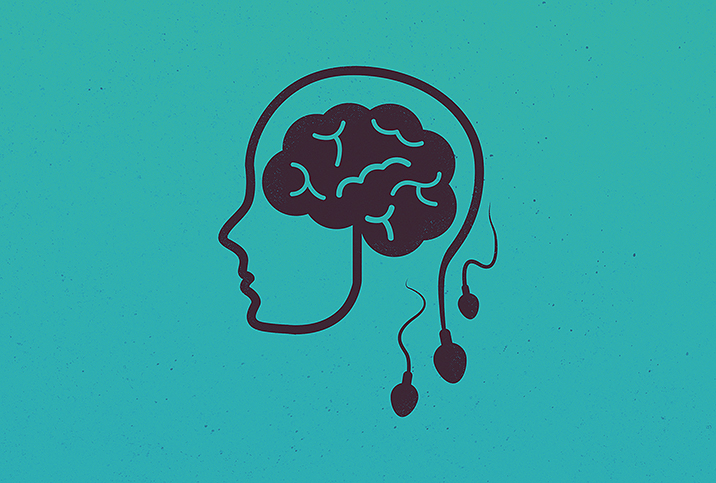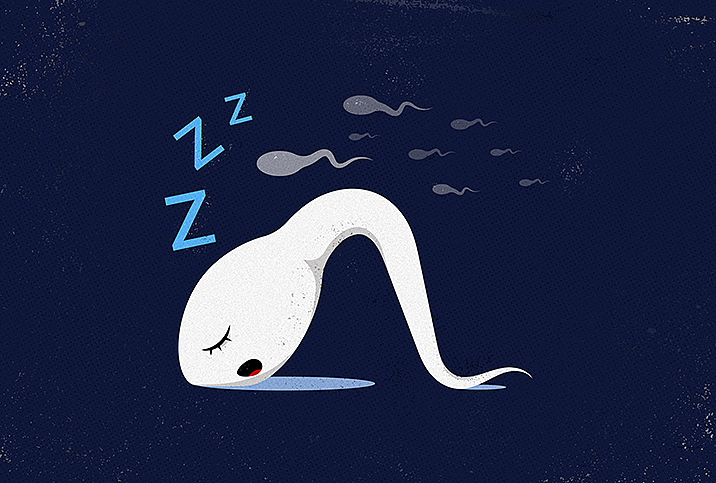Let These 5 Sperm Production Facts Swim in Your Brain

The body is responsible for many incredible biological processes, including the daily generation of millions of sperm cells.
This process, known as spermatogenesis, largely takes place in the seminiferous tubules located within the testes. During sperm production, the seminiferous tubules act as a kind of factory—one that may be larger than you think. A man has about 800 seminiferous tubules in each testicle, or 1,600 total. If these tubules were lined up end to end, they would measure about 1,950 feet, which would be much taller than the Empire State Building, according to a Harvard University database.
Let's take a closer look at sperm production and how it works.
1. It can take up to 74 days for a single sperm cell to mature.
Though the body produces millions of sperm cells a day, that doesn't mean each new cell is ready to fertilize an egg right away. After a sperm cell is produced within the walls of the seminiferous tubules inside the testicles, it remains there for up to 74 days as it transforms from a young germ cell to a mature sperm cell. During this period, other cells called Sertoli cells work to nourish the immature germ cells with various nutrients.
The maturation process is completed once the cells develop a head that contains genetic material and a tail that serves to help the sperm swim to an egg for fertilization. Once the sperm matures, it travels into the epididymis, the tube connected to the testicles that serves as a home for sperm before ejaculation. When ejaculation occurs, the sperm are carried out of the penis in seminal fluid, which is produced by the prostate gland.
2. Sperm count varies widely from man to man.
From the time males hit puberty, their body begins to generate millions of sperm cells daily. But a "typical" sperm count varies more than you might expect. Sperm densities that range from 15 million to 200 million or more sperm per milliliter of semen are considered normal and healthy, according to the Mayo Clinic. A low sperm count is considered fewer than 15 million sperm per milliliter or less than 39 million total sperm in each ejaculate.
3. Your testicles won't explode if you don't ejaculate for a while.
Considering an average man could be producing billions of sperm cells each month, it's natural to wonder where all those sperm go if you don't ejaculate for a while. Well, luckily, abstaining from ejaculation for an extended period won't cause your testicles to swell or drag to the ground. Experts say that when your testicles retain sperm over time, the sperm are gradually reabsorbed into your body. This means even if you don't ejaculate, the production process continues and a cycle of production and reabsorption into the body takes place.
However, even if you're intentionally avoiding ejaculation, sometimes nature takes over: Cue the wet dream. Involuntary ejaculation, while you sleep and dream, is not uncommon and is a natural response by the body, especially in teenagers going through puberty.
4. You won't run out of sperm from ejaculating too much.
Each ejaculation can contain 39 million sperm or more. And though that sounds like a high number, there's no need to worry that you will use up all your sperm by masturbating too much or having lots of sex in a short period. Your testicles are constantly producing sperm, so your reserve is too plentiful to be wiped out by a few crazy nights in a row. Experts estimate that a man's testicles generate about 1,500 sperm per second.
5. You may be able to naturally increase your sperm count.
Healthy sperm production can be affected by a number of largely controllable lifestyle choices. If you and your partner are struggling to conceive and think low sperm count might be the reason, you may be able to improve your odds with just a few changes.
Experts report that your sperm production is likely to improve if you quit smoking, avoid excessive drinking and avoid illicit drugs, all of which are known to negatively affect the male reproductive process. Exercising regularly and maintaining a balanced diet can go a long way, too, because obesity has been associated with male infertility.


















